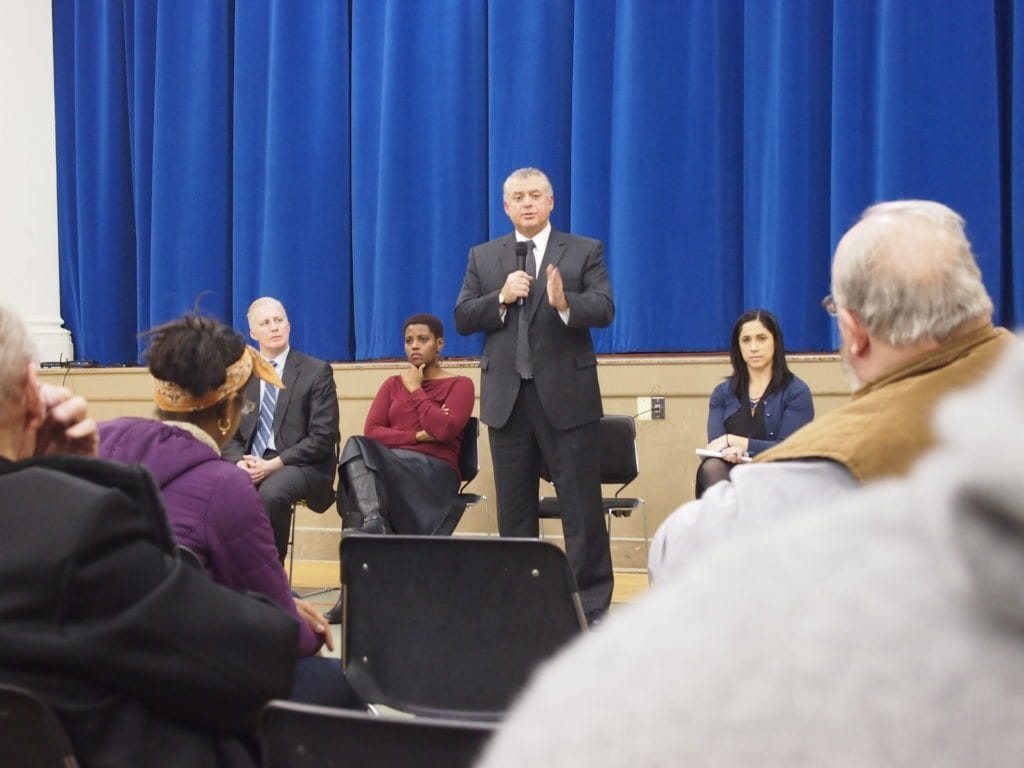Dorchester residents slam police abuse, question complaint process
Civilian review board still reviewing small sliver of total complaints

Yawu Miller
Teens in the Bowdoin Street area are regularly stopped by police, regardless of their involvement or lack of involvement with crime, residents of the Dorchester neighborhood say. Last week the issue took center stage during a meeting with city officials and neighborhood residents.
The meeting, convened by Rev. Jeffrey Brown, was meant to be a discussion about the city of Boston’s Community Ombudsman Oversight Panel (COOP), the three-member group that for the last seven years has provided community oversight of the Boston Police Department’s troubled citizen complaint process.
But community residents focused most of their questions on issues of racial profiling.
“The officers violate the constitution regularly,” said Dorchester resident Aaron Bray, a student at Harvard Law School who says he’s been stopped by the police “too many times to count.”
“How are you going to sit there with a straight face and tell me your officers don’t regularly violate the constitution?” he asked Superintendent Frank Mancini. “The data says it’s happening on a regular basis,” he said, citing a study of police data released last year by the ACLU of Massachusetts.
Mancini said the ACLU report did not establish that there was a pattern of discrimination in police stops.
“There is no evidence that there was any intentional bias,” he said, noting that the numerical disparities between the number of blacks and whites stopped by police could be explained by higher crime rates in the black community.
Bray remained unconvinced.
“You’re using your little pig jargon to get around the issue,” he told Mancini.
Dorchester resident Judy Meredith said teenagers and their parents don’t feel safe with the police.
“They get stopped all the time,” she said. “They get profiled all the time. It’s a fact.”
The discussion of the Community Ombudsman Oversight Panel was slightly less contentious. People filing complaints against police officers do so through the department’s Internal Affairs Division. While about 80 percent of civilian complaints against police are not sustained by Internal Affairs Division, complainants can appeal their decisions to the COOP within two weeks of the IAD decision.
Last year, there were 500 complaints against officers filed with IAD, up from an average of 300 a year. The COOP board reviewed 30 of the IAD decisions. New England Law Professor Natashia Tidwell, currently the only remaining member of the COOP, did not provide a breakdown of the 2014 complaints, many of which are still under review. But in 2012, the last year for which COOP provides data on its website, 19 of 23 cases the group completed were found to be fair and thorough, while four were not. An additional seven cases remained unresolved.
When the COOP flags cases as “not fair and thorough” they ask IAD to review the case again. If IAD refuses, COOP members can appeal to the Police Commissioner.
The impetus for a civilian review board in Boston came in 1992 from a recommendation in the St. Clair Commission report — issued in the wake of widespread rights violations of black teenagers and men during the police investigation of the 1989 Charles Stewart case. Twelve years later, then-Mayor Thomas Menino convened the panel.
Since it was convened, the COOP panel has quietly handled a small sliver of the complaints people have filed with the IAD.
Between 2008 and 2011, only 31 of the 900 people who filed complaints with IAD appealed their decisions to the COOP, and the panel flagged only four of those complaints for further review.
At last week’s meeting community residents questioned whether civilians are treated fairly in the complaint process. Mancini said a civilian’s word has the same weight as an officer’s during the IAD process.
Tidwell acknowledged that the panel reviews just a small portion (.6 percent) of the complaints civilians file with IAD.
“Could we use more people? Hell, yeah,” she said.
The panel could also use more powers. Tidwell, a former sergeant on the Cambridge Police Department who worked with that department’s Internal Affairs Division, noted that the Cambridge civilian review board can initiate its own investigations and complainants can file cases directly with the board, without going through an IAD investigation. The Cambridge board can subpoena witnesses and conducts public hearings.
City of Boston Corporation Counsel Eugene O’Flaherty, who convened the meeting, said the administration of Mayor Martin Walsh is open to suggestions on how the COOP can function better.
“The community has to have faith that when they have a complaint, it will be heard in a way that’s fair,” he said.




